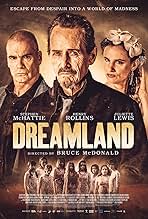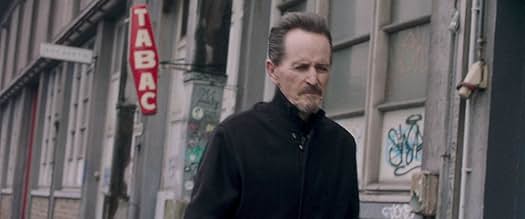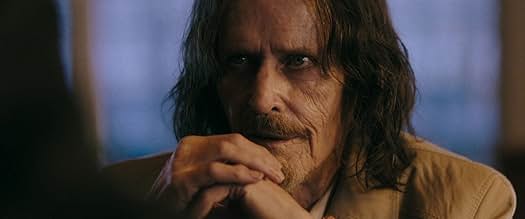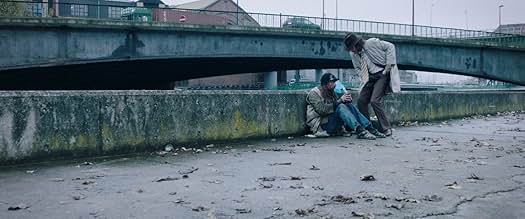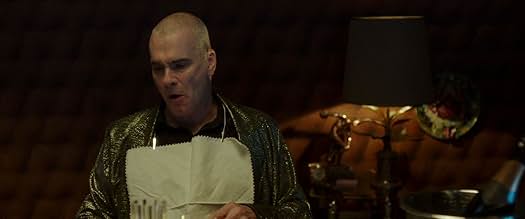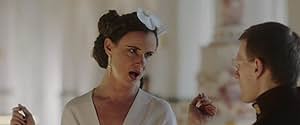अपनी भाषा में प्लॉट जोड़ेंOn the night of the strangest wedding in cinema history, a grotesque gang boss hires a stone cold killer to bring him the finger of a fading, drug-addicted jazz legend.On the night of the strangest wedding in cinema history, a grotesque gang boss hires a stone cold killer to bring him the finger of a fading, drug-addicted jazz legend.On the night of the strangest wedding in cinema history, a grotesque gang boss hires a stone cold killer to bring him the finger of a fading, drug-addicted jazz legend.
- निर्देशक
- लेखक
- स्टार
फ़ीचर्ड समीक्षाएं
Venerable Canuck director Bruce McDonald returns to the big screen with a strange, all you can watch cinema buffet of cult-aspiring dishes best presented as a main course. As a series of small, TV sized bites, this might work, but it becomes quite a muddle as a single entity.
The good: Stephen McHattie. Not surprisingly, McHattie shines in a dual role tour de force of endless crackly Clint Eastwood close ups, and tough guy bad assery.
The bad: Dual roles are never a good idea. It is disruptive, and proves way too clever for it's own good.
More bad: Juliette Lewis, who can be fabulously sensational, is fabulously awful, giddily embracing a despicable role in a volcanic spew of boorish overacting.
There's more. The list is long. Too long. We have Henry Rollins raging. We have a child sex ring. We have a silly vampire. We have a mess.
Brimming with taboo subjects, theatrical violence, absurdist sequences, nightclub lighting, an endless stream of odd characters, "Dreamland" is a prickly stab at "Twin Peaks" cultdom. McHattie almost pulls it off, with a performance for the ages that includes a bizarro Chet Baker impersonation. But it's not enough. What McDonald is trying to achieve here is anyone's guess, so here goes. How about an insider's heroin trip? Let's go with that.
The good: Stephen McHattie. Not surprisingly, McHattie shines in a dual role tour de force of endless crackly Clint Eastwood close ups, and tough guy bad assery.
The bad: Dual roles are never a good idea. It is disruptive, and proves way too clever for it's own good.
More bad: Juliette Lewis, who can be fabulously sensational, is fabulously awful, giddily embracing a despicable role in a volcanic spew of boorish overacting.
There's more. The list is long. Too long. We have Henry Rollins raging. We have a child sex ring. We have a silly vampire. We have a mess.
Brimming with taboo subjects, theatrical violence, absurdist sequences, nightclub lighting, an endless stream of odd characters, "Dreamland" is a prickly stab at "Twin Peaks" cultdom. McHattie almost pulls it off, with a performance for the ages that includes a bizarro Chet Baker impersonation. But it's not enough. What McDonald is trying to achieve here is anyone's guess, so here goes. How about an insider's heroin trip? Let's go with that.
- hipCRANK
In 2008, Bruce McDonald released 'Pontypool', a tense, darkly funny adaptation of Tony Burgess's novel 'Pontypool Changes Everything.' A fresh take on a stale genre- the zombie film- starring Stephen McHattie and Lisa Houle, it was a critical and commercial success. For years, McDonald planned on making a spin-off, featuring two characters- again played by McHattie and Houle- who appear after the end credits. A film he would later admit in an interview with Trouble City he "never really believed that we might shoot... because it seemed so crazy."
Shoot it they did, and crazy it is. 'Dreamland' follows laconic hitman Johnny Deadeyes, who is hired by Hercules, a nightclub owning pimp, to find a famous, faded jazz musician and cut off his finger. Meanwhile, an associate of Hercules's known as the Countess is organising a wedding reception for her brother, who happens to be a vampire with a taste for young blood. As Deadeyes embarks on his quest, he begins to examine his life; deciding to break out of the darkness that surrounds him.
It's a very strange affair, feeling at times like five different films spliced into one. The narrative veers this way and that, touching upon some interesting themes, but rarely exploring them beyond the surface level. The theme of redemption is central to Deadeyes' journey, as he grapples with the consequences of his violent past while seeking a path to atonement. However, this idea has been explored ad infinitum, and while McDonald doesn't have many fresh ideas on that point, rarely do those stories feature vampires and seedy covers of Eurythmics songs.
Meanwhile, human trafficking and exploitation are presented as stark realities that contrast with the film's more fantastical aspects, grounding the narrative in a grim social commentary; which, unfortunately, feels a bit ham-fisted and cursory. Despite that, McDonald successfully blurs the lines between reality and fantasy, mirroring Deadeyes' quest for purpose in a world lacking clear moral direction.
However, McDonald- and screenwriters Tony Burgess and Patrick Whistler- imbue the narrative with too many subplots and side characters, diluting Johnny Deadeyes' central quest for moral vindication. The addition of a child trafficking ring, as well as the aforementioned vampiric nuptials, distract rather than engage, and aren't well realised. McDonald doesn't delve into the complexities of these ideas, nor does the black comedy land consistently.
Conversely, the film is a visual delight. It is easy to compare to the works of David Lynch, as the velvet curtained, strangely lit world Deadeyes navigates harkens back to places explored by Jeffery Beaumont in 'Blue Velvet' or Nikki Grace in 'Inland Empire.' Eugénie Collet's production design is indeed Lynchian in nature, while Richard Van Oosterhout's unconventional cinematography compounds the strangeness of the narrative.
Van Oosterhout fosters a neo-noir atmosphere, and his work adds to the dreamlike quality of the film, creating a sense of disorientation aligning with Deadeyes' journey through the bizarre underworld. His employment of stark contrasts and shadows not only contributes to the film's noiresque atmosphere but also underscores the thematic contrasts between light and dark, reality and fantasy.
On the other hand, Jonathan Goldsmith's original score dominates every scene. Often, dialogue is obscured by his discordant melodies, and, while it does compound the film's atmosphere, it also distracts and irritates. Having said that, his interpretation of Eurythmics 'I Saved The World Today'- played over a slow-motion scene of violence- is both clever and powerful; although McDonald and editor Duff Smith are probably more deserving of praise in this regard.
Stephen McHattie stars as Johnny Deadeyes and the jazz musician, opposite Henry Rollins as Hercules and Juliette Lewis as the Countess. The always reliable McHattie's dual performances as Deadeyes and the jazz musician are a testament to his acting prowess. As the hitman, he exudes a weary stoicism, his eyes reflecting a history of violence and regret. In contrast, his portrayal of the jazz musician is imbued with a melancholic nostalgia, his every gesture suggesting a fall from grace.
Rollins, meanwhile, brings a menacing charisma to the role of Hercules, embodying the character with a predatory grace making him a formidable presence on screen. His performance adds a layer of unpredictability to the film's already eclectic atmosphere. Lewis seems hell-bent on chewing as much scenery as she can, though, in a way, captures the complexity of a character who is at once seductive and dangerous, further enriching the film's tapestry of dark and intriguing figures.
Although rather uneven and lumbered with too many subplots and side characters, Bruce McDonald's 'Dreamland' is worth a watch, especially for fans of Stephen McHattie. A strange trip into a dark underworld, the narrative engages as well as disappoints; but is never uninteresting. The production design and cinematography are striking and bizarre, even while the score is rather over-the-top. However, Stephen McHattie is brilliant, ensuring that, despite its issues, 'Dreamland' is not a nightmare.
Shoot it they did, and crazy it is. 'Dreamland' follows laconic hitman Johnny Deadeyes, who is hired by Hercules, a nightclub owning pimp, to find a famous, faded jazz musician and cut off his finger. Meanwhile, an associate of Hercules's known as the Countess is organising a wedding reception for her brother, who happens to be a vampire with a taste for young blood. As Deadeyes embarks on his quest, he begins to examine his life; deciding to break out of the darkness that surrounds him.
It's a very strange affair, feeling at times like five different films spliced into one. The narrative veers this way and that, touching upon some interesting themes, but rarely exploring them beyond the surface level. The theme of redemption is central to Deadeyes' journey, as he grapples with the consequences of his violent past while seeking a path to atonement. However, this idea has been explored ad infinitum, and while McDonald doesn't have many fresh ideas on that point, rarely do those stories feature vampires and seedy covers of Eurythmics songs.
Meanwhile, human trafficking and exploitation are presented as stark realities that contrast with the film's more fantastical aspects, grounding the narrative in a grim social commentary; which, unfortunately, feels a bit ham-fisted and cursory. Despite that, McDonald successfully blurs the lines between reality and fantasy, mirroring Deadeyes' quest for purpose in a world lacking clear moral direction.
However, McDonald- and screenwriters Tony Burgess and Patrick Whistler- imbue the narrative with too many subplots and side characters, diluting Johnny Deadeyes' central quest for moral vindication. The addition of a child trafficking ring, as well as the aforementioned vampiric nuptials, distract rather than engage, and aren't well realised. McDonald doesn't delve into the complexities of these ideas, nor does the black comedy land consistently.
Conversely, the film is a visual delight. It is easy to compare to the works of David Lynch, as the velvet curtained, strangely lit world Deadeyes navigates harkens back to places explored by Jeffery Beaumont in 'Blue Velvet' or Nikki Grace in 'Inland Empire.' Eugénie Collet's production design is indeed Lynchian in nature, while Richard Van Oosterhout's unconventional cinematography compounds the strangeness of the narrative.
Van Oosterhout fosters a neo-noir atmosphere, and his work adds to the dreamlike quality of the film, creating a sense of disorientation aligning with Deadeyes' journey through the bizarre underworld. His employment of stark contrasts and shadows not only contributes to the film's noiresque atmosphere but also underscores the thematic contrasts between light and dark, reality and fantasy.
On the other hand, Jonathan Goldsmith's original score dominates every scene. Often, dialogue is obscured by his discordant melodies, and, while it does compound the film's atmosphere, it also distracts and irritates. Having said that, his interpretation of Eurythmics 'I Saved The World Today'- played over a slow-motion scene of violence- is both clever and powerful; although McDonald and editor Duff Smith are probably more deserving of praise in this regard.
Stephen McHattie stars as Johnny Deadeyes and the jazz musician, opposite Henry Rollins as Hercules and Juliette Lewis as the Countess. The always reliable McHattie's dual performances as Deadeyes and the jazz musician are a testament to his acting prowess. As the hitman, he exudes a weary stoicism, his eyes reflecting a history of violence and regret. In contrast, his portrayal of the jazz musician is imbued with a melancholic nostalgia, his every gesture suggesting a fall from grace.
Rollins, meanwhile, brings a menacing charisma to the role of Hercules, embodying the character with a predatory grace making him a formidable presence on screen. His performance adds a layer of unpredictability to the film's already eclectic atmosphere. Lewis seems hell-bent on chewing as much scenery as she can, though, in a way, captures the complexity of a character who is at once seductive and dangerous, further enriching the film's tapestry of dark and intriguing figures.
Although rather uneven and lumbered with too many subplots and side characters, Bruce McDonald's 'Dreamland' is worth a watch, especially for fans of Stephen McHattie. A strange trip into a dark underworld, the narrative engages as well as disappoints; but is never uninteresting. The production design and cinematography are striking and bizarre, even while the score is rather over-the-top. However, Stephen McHattie is brilliant, ensuring that, despite its issues, 'Dreamland' is not a nightmare.
25% of this movie is a closeup of Stephen McHattie's face while he murmurs about something unimportant, slowly.
I am not going to waste time doing a long review of this movie. I find nothing positive, nothing good, nothing that I can put on the other side of the scale to be objective, or try to be fair. The movie is the worst movie I have seen in a long time. The script is bad, the direction is ... what direction? It seems directed by an 11-year-old boy, who is not up to date with digital technology, of course. The protagonist's double acting does not make sense. In fact, nothing in this movie has it. If you want to waste your time, go ahead and watch it. My big question is how do they get all the money to make a movie with such a script? Are they laundering money? Is it money from some eccentric millionaire? It is a mystery why there are people willing to put millions into such a project, when there are so many good projects waiting for a single penny. It's not fair. It is a waste of budget and a stone in the face of the actors who participated in it. Unbelievable.
It was ages ago when I had the pleasure of enjoying "Pontypool" for the first time, and it is still my favorite Bruce McDonald movie, favorite Stephen McHattie movie, one favorite Canadian horror movies, and horror movies in general. So you bet I was excited for "Dreamland", a movie that potentially has the makings of my beloved genre of arthouse, and has "Pontypool's" front team - director, writer and lead actor. It was a trip. A mighty flawed one, but soaked in weirdness, and we love the oddballs, yes we do.
"Dreamland" happens in a rather funky universe, which takes place in Luxembourg. Stephen McHattie portrays a killer for hire working for the grotesque gang boss Hercules or Henry Rollins, and things are set in motion when the killer is sent to collect a finger from a fading, drug-addicted jazz legend, also portrayed by Stephen McHattie. On the same day, a strange and freaky wedding is about to take place under the helm of town's richest, the Countess, brought to us by Juliette Lewis.
"Dreamland" is a movie that, in my view, is completely unashamed of itself and its odd antics, some props have to be given for the fact that it felt like they carried on exactly as they wished to. The story, environment and its inhabitants, the way everything plays out, feels really rather poetic, almost like a theatre play adapted into a screenplay. Shakespearean - is a word that kept coming to me. The rather bare story bones are thoroughly covered with philosophical pandering, lots of interpret-it-yourself notes. It'd seem that Bruce McDonald and the screenwriters have set out to exercise in existentialism, approaching it through the scope of surrealism, dry satire and perhaps trying to mix some David Lynch in the middle, while also forcing hand at making a violent killer/crime underworld thriller. In the end, "Dreamland" also feels like it couldn't decide on one main thing, so it went a little with all of it, which makes the movie feel too episodic and weakly weaved together, which consequently makes the pacing suffer, which is, in my opinion, its biggest flaw. The next would be its contents, so weird and arguably insubstantial, the kind of stuff that really gets split when it comes to subjectivism, taste, preferences and individual philosophies.
"Dreamland" looks and feels as indie as it gets, certainly a B budget movie, but pretty good one at that. The cast is superb, Stephen McHattie alone provides, and I had no idea he's playing a dual role. An underappreciated and amazing actor, I really recommend checking out some of his work. Given the fact that one of the characters is a trompetist, it comes as no surprise that the original score is solid and fitting, reminding slightly of the kind you'd hear in "Sin City". And cinematography's great, dynamic, with some low budget solutions here and there, and no worries on violence and FX, there's a fair amount of it.
"Dreamland" is a movie that generally will probably be received rather poorly, but it has a lot of oddities going for it, which is something I'm always on the lookout for, and there really are not nearly enough movies led by Stephen McHattie. This one deserves a 6/10 from me, and I recommend it to everyone who enjoys the many shades of weird.
"Dreamland" happens in a rather funky universe, which takes place in Luxembourg. Stephen McHattie portrays a killer for hire working for the grotesque gang boss Hercules or Henry Rollins, and things are set in motion when the killer is sent to collect a finger from a fading, drug-addicted jazz legend, also portrayed by Stephen McHattie. On the same day, a strange and freaky wedding is about to take place under the helm of town's richest, the Countess, brought to us by Juliette Lewis.
"Dreamland" is a movie that, in my view, is completely unashamed of itself and its odd antics, some props have to be given for the fact that it felt like they carried on exactly as they wished to. The story, environment and its inhabitants, the way everything plays out, feels really rather poetic, almost like a theatre play adapted into a screenplay. Shakespearean - is a word that kept coming to me. The rather bare story bones are thoroughly covered with philosophical pandering, lots of interpret-it-yourself notes. It'd seem that Bruce McDonald and the screenwriters have set out to exercise in existentialism, approaching it through the scope of surrealism, dry satire and perhaps trying to mix some David Lynch in the middle, while also forcing hand at making a violent killer/crime underworld thriller. In the end, "Dreamland" also feels like it couldn't decide on one main thing, so it went a little with all of it, which makes the movie feel too episodic and weakly weaved together, which consequently makes the pacing suffer, which is, in my opinion, its biggest flaw. The next would be its contents, so weird and arguably insubstantial, the kind of stuff that really gets split when it comes to subjectivism, taste, preferences and individual philosophies.
"Dreamland" looks and feels as indie as it gets, certainly a B budget movie, but pretty good one at that. The cast is superb, Stephen McHattie alone provides, and I had no idea he's playing a dual role. An underappreciated and amazing actor, I really recommend checking out some of his work. Given the fact that one of the characters is a trompetist, it comes as no surprise that the original score is solid and fitting, reminding slightly of the kind you'd hear in "Sin City". And cinematography's great, dynamic, with some low budget solutions here and there, and no worries on violence and FX, there's a fair amount of it.
"Dreamland" is a movie that generally will probably be received rather poorly, but it has a lot of oddities going for it, which is something I'm always on the lookout for, and there really are not nearly enough movies led by Stephen McHattie. This one deserves a 6/10 from me, and I recommend it to everyone who enjoys the many shades of weird.
क्या आपको पता है
टॉप पसंद
रेटिंग देने के लिए साइन-इन करें और वैयक्तिकृत सुझावों के लिए वॉचलिस्ट करें
- How long is Dreamland?Alexa द्वारा संचालित
विवरण
- चलने की अवधि1 घंटा 32 मिनट
- रंग
- पक्ष अनुपात
- 2.39:1
इस पेज में योगदान दें
किसी बदलाव का सुझाव दें या अनुपलब्ध कॉन्टेंट जोड़ें






